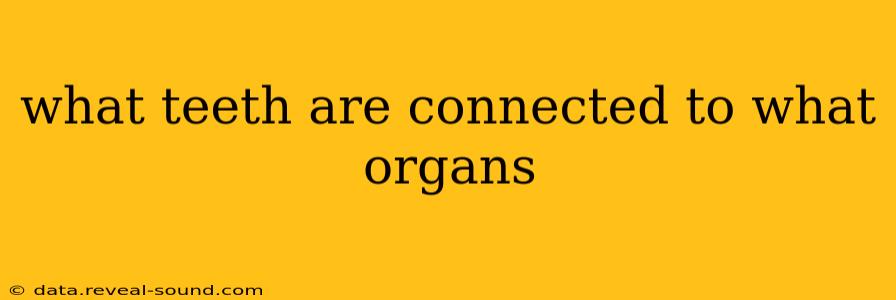What Teeth Are Connected to What Organs?
The idea that specific teeth are directly connected to specific organs is a concept rooted in traditional medicine and practices like Traditional Chinese Medicine (TCM). However, modern Western medicine does not support this claim. There's no scientifically proven anatomical or physiological link between individual teeth and particular organs. The notion of such connections is largely considered a misconception.
While there's no direct connection, it's crucial to understand the relationship between oral health and overall well-being. Poor oral hygiene can lead to various health problems, indirectly affecting different parts of the body.
Let's explore some frequently asked questions that often surround this topic:
Are there any connections between teeth and organs in Traditional Chinese Medicine?
Traditional Chinese Medicine (TCM) features a system of meridian lines that are believed to run throughout the body, including pathways that connect specific teeth to organs. For example, some practitioners associate the upper incisors with the heart and lungs, the upper canines with the liver and gallbladder, and premolars with the stomach and spleen. It's essential to emphasize that this is a belief system based on different principles than those of modern Western medicine, and the evidence supporting these connections is not based on the same rigorous scientific methodology.
How can poor oral health affect other organs?
While there aren't direct connections, poor oral hygiene can have significant consequences for overall health. Infections like gingivitis and periodontitis (gum disease) can lead to:
- Cardiovascular issues: Bacteria from infected gums can enter the bloodstream and contribute to the development of heart disease and stroke.
- Respiratory problems: Bacteria from the mouth can be aspirated into the lungs, worsening conditions like pneumonia or bronchitis.
- Diabetes complications: Gum disease can make it harder to control blood sugar levels in people with diabetes, leading to more severe complications.
- Preterm birth and low birth weight: Studies suggest a link between gum disease and adverse pregnancy outcomes.
- Rheumatoid arthritis: Some studies indicate a correlation between periodontitis and rheumatoid arthritis.
The above connections are indirect; they demonstrate the impact of systemic inflammation caused by poor oral health, rather than a direct link between specific teeth and organs.
What is the significance of the "tooth-organ connection" in other cultures?
Many cultures throughout history have held beliefs about the connections between teeth and specific organs or body parts. These beliefs are often interwoven with traditional medicine and healing practices, passed down through generations. While interesting from an anthropological and historical perspective, it's crucial to remember that these beliefs lack scientific validation based on modern medical understanding.
Why are these misconceptions so prevalent?
The belief in a direct tooth-organ connection persists partly due to the interconnectedness of the body. Inflammation originating in the mouth can, indeed, affect other systems. However, this isn't a specific connection between individual teeth and organs, but rather a consequence of systemic inflammation spread through the bloodstream. The lack of widespread understanding of the complexities of inflammation and the body's interconnected systems further contributes to these misconceptions.
In conclusion, while the concept of specific teeth correlating to specific organs is prevalent in some traditional medical systems, modern science does not support this claim. Maintaining good oral hygiene is crucial for overall health because of the potential for oral infections to spread, leading to various health complications. Always consult your doctor or dentist for professional advice on your health and oral care.
